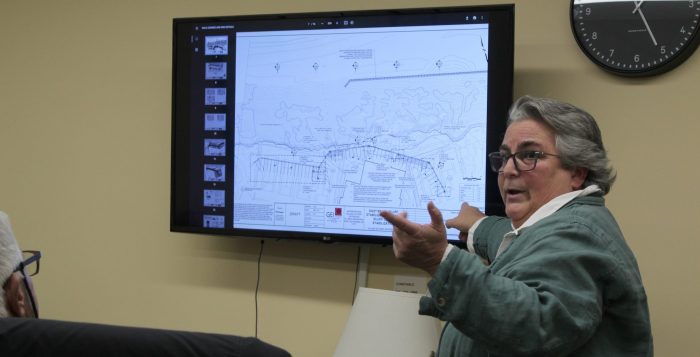Westerly wall on the drawing board at East Beach bluff, trustees debate rideshare service, school capital bond and landfill

The Village of Port Jefferson Board of Trustees convened Tuesday, Jan. 17. The board tackled a range of subjects from upcoming coastal engineering projects to a rideshare service and school district facilities.
A proposed westerly wall
Mayor Margot Garant reported a development to the coastal engineering plans at the East Beach bluff, where erosion threatens the village-owned Port Jefferson Country Club’s clubhouse facility.
With $3.75 million in federal funds secured for an upland wall to protect the building [See story, “Schumer secures funds for upper wall at PJCC …” The Port Times Record, Jan. 12], the mayor announced her team is exploring ways to finalize its upland plans.
A proposed “westerly wall,” originally pitched as an add-on extension to the upper wall to accommodate racket sports, is now recommended as a possible erosion mitigation strategy. Huntington Station-based engineering firm GEI Consultants “did confirm that they definitely feel we need to do both the main wall and the extension wall,” Garant said.
The village board put the upper wall projects to bid in October, announcing the cost projections the following month. The upper wall bid came back at approximately $3.3 million, with the combined upper wall and westerly wall project costing roughly $4.5 million.
Considering which option is most suitable for the village, Garant outlined why she favors constructing the westerly wall: “I believe that putting that second wall in there, now unequivocally, if somebody else is paying 75% of that cost, I think the westerly wall should go in,” she said.
Forecasting how to organize the racket sports facilities once the westerly wall is complete, Garant suggested it will be a problematic decision-making calculus regarding which racket sports to prioritize.
“We may be wanting to install more than three pickleball courts because the demand is so high and trying to get maybe an instructional court, and maybe just have the two [tennis] courts in the back,” she said. “We have to figure out when, how, where, timing, materials, cost. It’s complicated.”
She added, “The good news is we’re going to be building a wall. I think that saves a major resource for this community. I think it allows us to reinstate a racket ball campus. And I think it gives us a reasonable timeline to come up with an alternate plan, god forbid in 20 years, we need to have something different in place.”
Ridesharing service
Deputy Mayor Kathianne Snaden and Kevin Wood, director of economic development, parking administrator and communications committee head, jointly presented on a rideshare project.
The benefits of the plan, as Snaden explained, are threefold: to offer residents easy access to downtown Port Jefferson, provide a safe means of return travel to their homes and ease traffic congestion.
“I think we have something that’s really going to work for the residents of Port Jefferson,” the deputy mayor said, adding that the goal is “to get them downtown, to save parking for the tourists and others, and to come down, have a nice evening and get home safely.”
Wood worked out how the village would implement such a rideshare program. “The plan that you have in front of you would be to combine world-class, Uber-like software with a black car service to be exclusively used and designed for Port Jefferson residents,” he said.
Offering a rough sketch of his vision, Wood said the service would operate Fridays and Saturdays from 4 p.m. to 1 a.m. The village government would administer the software, which would be geofenced for Port Jefferson, meaning requests outside the 11777 zip code could not be possible. “If somebody wanted to go to Smith Haven Mall, they can’t,” Wood said.
He proposed that rides could start at $5 per person and $12.50 for groups of three to seven people. These figures could be subject to change as the village would adjust the software and set its rates based on the community’s needs.
“The beautiful part about this is that if we find that $5 is literally not enough money or too much money, I think we have some leeway there and could change this stuff on a dime,” Wood said. “We can change things on demand. We can make new group rates. We could do special event rates.”
Village attorney Brian Egan inquired whether this program could create centralized drop-off locations for riders, preventing clutter of village roads and safety hazards from stopped vehicles. Responding, Wood said the village could train drivers to drop off and pick up riders to minimize these risks.
Garant put her support behind the effort, saying this will benefit residents who wish to access their downtown amid its busy season. “We all, I’ll speak for myself, feel we’re getting snowed out in the middle of the summertime,” the mayor said. “You can’t get down here, so I think this is going to be something that I’m really excited about.”
Reports
Egan updated the board on the ongoing negotiations with the New York State Department of Environmental Conservation. The village is attempting to reclassify the Port Jefferson Clean Solid Waste Landfill as a transfer station, enabling the continued procedure of branch and leaf pickup services. [See story, “Garbage grief: PJ Village and DEC clash over landfill permit,” The Port Times Record, Dec. 1].
“I do think we have — at least with the DEC senior administrative staff — a very receptive ear,” he said. Referring to the permit dispute with DEC, he added, “I think we’ll have a cooperative resolution to it, and I am cautiously optimistic.”
Trustee Lauren Sheprow used her report to discuss a forthcoming capital bond at Port Jefferson School District. “The school district is looking at floating another bond in May,” she said.
Citing an article in Newsday, Sheprow said approximately 80% of federal COVID-19 relief funds have yet to be spent by public schools statewide. “$14 billion has not been used yet,” she said. “There’s $14 billion issued to New York State in COVID relief,” adding that the heating and ventilation systems proposed by PJSD may qualify under COVID relief conditions.
Sheprow added she might pitch her ideas to the school board during its upcoming meeting Tuesday, Jan. 24. She encouraged her fellow board members to attend.
Snaden reported on a meeting with the Port Jefferson Business Improvement District and the Greater Port Jefferson Chamber of Commerce. This year’s iteration of the Port Jefferson Ice Festival, hosted by the BID on Jan. 28 and 29, will feature 27 ice sculptures at various storefronts and other locations throughout Port Jeff.
Trustee Stan Loucks reported on winter projects at PJCC. He said 188 members have already signed up for this year as of the time of this meeting. Trustee Rebecca Kassay was absent and did not deliver a report by proxy.
The board of trustees will meet again Monday, Feb. 6, with a scheduled public hearing to amend the village code concerning dogs and other animals.






